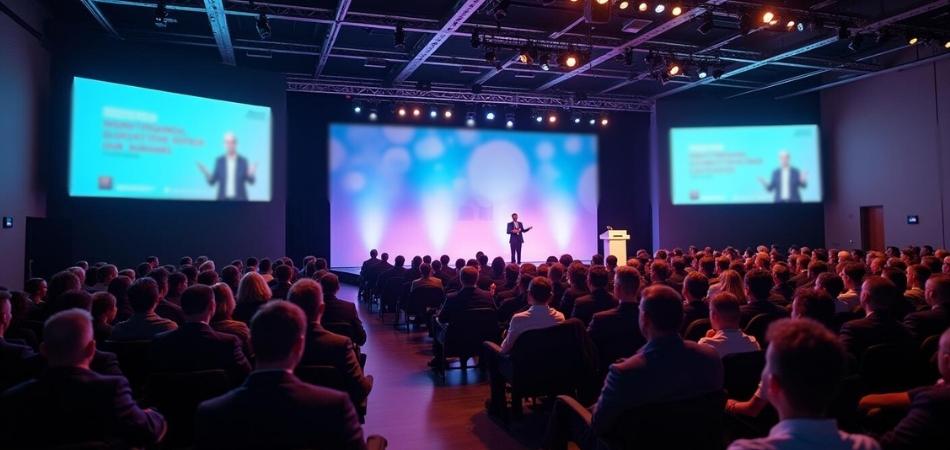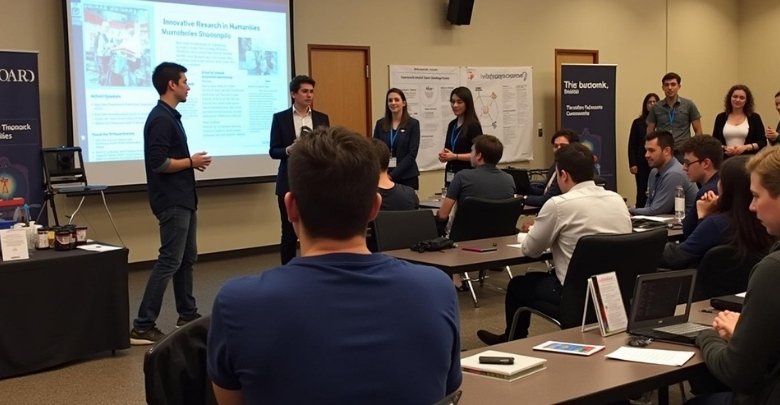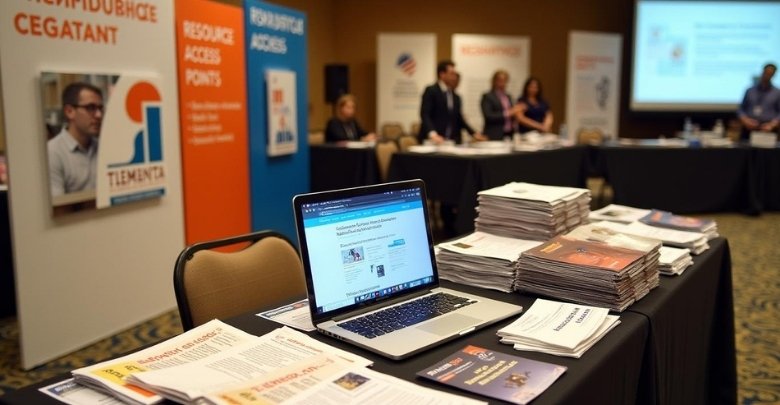Humanities conferences offer a platform for insightful discussions on culture, history, literature, philosophy, and social justice. Renowned scholars, educators, and professionals take the opportunity to share research, exchange ideas, and engage in meaningful dialogue at these conferences. For you to find the best conferences, here are a few among the top 10 humanities conferences in Canada 2025.
Canada will host several notable humanities conferences that encourage scholarly engagement in 2025. Events such as the Global Conference on Religious Studies and Peace, the Canadian Conference on Humanities and Social Sciences, and the WNORTH Conference will bring together global leaders and peace advocates to discuss the role of humanities in addressing global challenges.
If you’re interested in contributing to meaningful discussions and advancing scholarship in the humanities, take part in these conferences. Whether you are presenting your research, networking with industry leaders, or simply gaining new perspectives, the conferences provide a valuable platform for professional growth and collaboration.
List Of Top 10 Humanities Conferences in Canada 2025
| Date | Conference Name | Venue |
| Apr 19, 2025 | 4th Global Conference on Religious Studies and Peace (GCRSP) | Toronto, Canada |
| Mar 11 – 15, 2025 | The Beautiful Gospel Gathering | Creek Drive Canmore, Canada |
| Apr 30 – May 2, 2025 | WNORTH Conference 2025 | Whistler, Canada |
| May 16 -18, 2025 | 8th Global Conference on Arts, Education, and Humanities (GCAEH) | Vancouver, Canada |
| May 28 – May 30, 2025 | Church Growth International Conference Saskatchewan Canada 2025 | Broad Street Regina, SK, Canada |
| May 16 -18, 2025 | 3rd Global Conference on Religious Studies and Peace (GCRSP) | Vancouver, Canada |
| July 19-20, 2025 | International Conference on Social Sciences and Humanities ICSH | Toronto, Canada |
| Jul 25-27, 2025 | Conference on Research in Humanities and Social Sciences | Toronto, Canada |
| Apr 19, 2025 | 9th Global Conference on Arts, Education, and Humanities (GCAEH) | Toronto, Canada |
| Oct 04-05, 2025 | 7th Canadian Conference on Humanities and Social Sciences | Toronto, Canada |
1. 4th Global Conference on Religious Studies and Peace (GCRSP)
The 4th Global Conference on Religious Studies and Peace (GCRSP) will be held on April 19, 2025, in Toronto, Canada. This conference will explore the relationship between religion and peace building. As part of significant humanities conferences in Canada, it provides a platform for discussing interfaith dialogue and conflict resolution strategies.
2. The Beautiful Gospel Gathering
From March 11–15, 2025, The Beautiful Gospel Gathering in Creek Drive, Canmore, Canada, will bring together faith communities for collective reflection and spiritual dialogue. The event will center on shared gospel teachings, encouraging participants to engage in meaningful conversations about faith, worship, and cultural harmony.
3. WNORTH Conference 2025
The WNORTH Conference is scheduled for April 30–May 2, 2025, in Whistler, Canada. Leadership and gender equality will be the focus of this event’s discussions and workshops, which are designed to support professional women in leadership positions and promote a culture of inclusion in the workplace.
4. 8th Global Conference on Arts, Education, and Humanities (GCAEH)
As part of the 8th Global Conference on Arts, Education, and Humanities (GCAEH), scholars and educators from across the globe will meet in Vancouver, Canada, from May 16–18, 2025. This conference promotes the exchange of ideas on cultural preservation and innovative educational practices.
5. Church Growth International Conference Saskatchewan Canada 2025
The Church Growth International Conference Saskatchewan Canada 2025 will take place from May 28–30, 2025, at Broad Street, Regina, SK. This event invites faith leaders and community organizers to explore strategies for promoting spiritual growth, community engagement, and sustainable church development within evolving societal contexts.
6. 3rd Global Conference on Religious Studies and Peace (GCRSP)
The 3rd Global Conference on Religious Studies and Peace (GCRSP) will take place from May 16–18, 2025, in Vancouver, Canada. This event will focus on religious diversity and peace efforts, bringing together scholars to examine how religious studies can contribute to conflict resolution and global knowledge.
7. International Conference on Social Sciences and Humanities (ICSH)
The International Conference on Social Sciences and Humanities (ICSH) will be held in Toronto, Canada, from July 19-20, 2025. There will be expert discussions on key issues affecting societies around the world today. This conference will provide a platform for addressing social justice, cultural identity, and the evolving roles of humanities in modern education. It promises a rich exchange of ideas to inspire action and promote societal change.
8. Conference on Research in Humanities and Social Sciences
The Conference on Research in Humanities and Social Sciences will be held in Toronto, Canada, from July 25-27, 2025. This conference will explore interdisciplinary research in humanities and social sciences, encouraging dialogue on topics such as human rights, cultural evolution, and the role of education in shaping societal values. It will offer an excellent opportunity for researchers and academics to share their findings and collaborate on global solutions.
9. 9th Global Conference on Arts, Education, and Humanities (GCAEH)
The 9th Global Conference on Arts, Education, and Humanities (GCAEH) will be held on April 19, 2025, in Toronto, Canada. Focused on encouraging creative collaborations and cultural discussions, this conference will address the intersection of arts and education, examining how the arts influence social change and the global education system. It is an essential conference for those interested in innovative approaches to education and the arts.
10. 7th Canadian Conference on Humanities and Social Sciences
The 7th Canadian Conference on Humanities and Social Sciences will take place on October 4-5, 2025, in Toronto, Canada. This event will explore crucial issues in both humanities and social sciences, promoting scholarly exchanges on cultural heritage, global issues, and educational transformation. Participants will engage in thoughtful discussions aimed at advancing the impact of humanities on policy, education, and social development.
How Humanities Conferences Contribute to Peace and Unity?
A peaceful and united world requires open communication and cultural awareness in today’s interconnected world. Humanities conferences offer valuable spaces where scholars, educators, and community leaders gather to explore historical, cultural, and social issues. These events encourage thoughtful discussions that inspire collaboration and practical solutions for a more harmonious global society.
Encouraging Cross-Cultural Understanding
Humanities conferences provide spaces for participants from diverse backgrounds to engage in meaningful discussions. By exploring different cultural perspectives, attendees gain deeper insights into global traditions, values, and histories. This knowledge helps break down prejudices, promoting mutual respect and encouraging peaceful coexistence across cultures.
Promoting Interdisciplinary Collaboration
Bringing together experts from various humanities disciplines encourages collaboration on social issues. Interdisciplinary discussions integrate ideas from history, philosophy, literature, and sociology, offering holistic approaches to conflict resolution and social justice. This exchange leads to innovative solutions for promoting unity and addressing societal challenges.
Facilitating Constructive Dialogue
These conferences create environments for open and respectful conversations on sensitive topics. Through discussions on religion, identity, and social justice, participants learn to approach disagreements thoughtfully. Constructive discussion encourages empathy and compatibility, reducing polarization and contributing to peaceful solutions in communities.
Highlighting Historical Lessons
By examining historical events and movements, humanities conferences help contextualize present-day conflicts. Societies can avoid repeating mistakes by understanding past struggles and resolutions. These insights offer practical frameworks for resolving modern disputes and promoting unity through shared historical awareness.
Addressing Social Inequalities
Conferences often focus on topics like human rights, gender equality, and racial justice. Presentations and workshops offer crucial analyses of social inequalities, inspiring attendees to challenge discrimination and work toward more inclusive societies. This commitment to equity serves as a foundation for long-term peace and harmony.
Strengthening Community Engagement
Local and global communities benefit from the outreach and initiatives that emerge from these events. Participants often collaborate on community-based projects addressing social issues. Such engagement encourages collective responsibility and nurtures a sense of unity, driving positive change beyond academic settings.
Building Global Networks
Networking at humanities conferences connects individuals committed to social progress. These global networks facilitate knowledge sharing and joint initiatives aimed at addressing international challenges. This cooperation supports peace building efforts by uniting diverse voices in collective actions for positive social transformation.
Amplifying Marginalized Voices
These conferences offer platforms for underrepresented communities to share their experiences and perspectives. Including diverse voices in discussions promotes inclusivity and challenges dominant narratives. Acknowledging and valuing these contributions strengthens societal cohesion and promotes more just and peaceful societies.
Inspiring Policy and Educational Reforms
Research and discussions at humanities conferences often influence educational content and public policies. By addressing issues like cultural representation and social justice, these insights inform reforms that prioritize inclusivity and equity. Such systemic changes contribute to sustainable peace and societal well-being.
Implementing Ethical Leadership
By exploring ethical frameworks and philosophical principles, humanities conferences inspire leaders to prioritize compassion and justice. Discussions on ethical decision-making equip policymakers, educators, and community leaders with tools to create fairer, more peaceful societies grounded in mutual respect and knowledge.
Travel Tips for Humanities Conferences in Canada 2025
Attending humanities conferences in Canada in 2025 offers a valuable opportunity to engage with global thought leaders and scholars. To make the most of your experience, careful planning and preparation are essential. Here are some practical travel tips to help you begin your journey smoothly and focus on meaningful participation.
- Plan Early and Book Accommodations in Advance: Conference seasons can make hotels and accommodations fill up quickly. Secure your stay early near the venue for convenience and better rates.
- Check Visa and Entry Requirements: International attendees should review Canada’s visa policies and apply well in advance. Ensure your passport is valid for at least six months beyond your travel dates.
- Pack for Variable Weather: Canada’s weather can vary greatly by region and season. Bring layered clothing and check the local forecast for the conference dates to stay comfortable.
- Keep Essential Documents Handy: Carry printed and digital copies of your conference registration, hotel reservations, and identification for easy access during travel and check-ins.
- Use Public Transit and Ride-Sharing Apps: Major Canadian cities offer efficient public transportation. Consider using transit passes or ride-sharing services to save time and get around easily.
- Budget for Meals and Local Activities: While many conferences provide refreshments, plan for additional meals and explore local dining options. Allocate time and budget to experience nearby attractions.
- Network Beyond the Conference: Connect with attendees outside formal sessions. Attend social events or local meetups to expand your professional network and gain fresh perspectives.
- Stay Connected with Mobile Data or Wi-Fi: Ensure you have a local SIM card or international roaming plan to stay connected. Many venues offer free Wi-Fi, but it’s wise to have a backup.
- Adjust to the Time Zone: Arrive a day or two early if traveling across time zones. This allows you to adjust and participate in sessions with full energy and focus.
- Respect Local Customs and Cultures: Familiarize yourself with Canadian cultural norms and local customs. This will maximize your experience and ensure respectful interactions throughout your stay.
How These Conferences Integrating Ethics and Morality?
Humanities conferences in Canada 2025 are deeply rooted in ethical and moral considerations, forming discussions that impact society. These events emphasize responsible scholarship, inclusive discussions, and socially conscious practices. By integrating ethics and morality, these conferences inspire participants to engage thoughtfully and contribute to a more just and compassionate world. These conferences integrate ethics and morality in the following ways:
Encouraging Ethical Research Practices
Conferences promote responsible research by highlighting the importance of ethical data collection, source validation, and fair representation of subjects. Presenters are encouraged to follow guidelines that prioritize transparency and accountability, ensuring that their work contributes positively to academic integrity and societal well-being.
Addressing Global Social Justice Issues
Sessions often focus on crucial topics such as human rights, inequality, and environmental justice. These discussions challenge participants to reflect on global injustices and consider ethical solutions that respect cultural differences and promote collective responsibility for social change.
Promoting Inclusive Dialogue
By creating inclusive spaces, these conferences welcome diverse voices, especially from marginalized communities. This commitment to inclusivity ensures that discussions are enriched with varied perspectives, encouraging empathy and ethical engagement with complex social and cultural issues.
Promoting Sustainable Event Practices
Organizers are adopting environmentally conscious practices, such as reducing waste and using sustainable materials. Ethical considerations extend to event planning, encouraging participants to reflect on how collective actions can support environmental responsibility and social impact.
Integrating Philosophical Ethics in Discussions
Sessions often explore philosophical frameworks around ethics and morality, encouraging participants to apply ethical reasoning to contemporary issues. This integration helps connect theory and practice, promoting critical thinking about how moral values influence decision-making and policy development.
Highlighting Cultural Sensitivity and Respect
Conferences emphasize respecting cultural traditions and practices when discussing global issues. Presentations are designed to avoid cultural appropriation and stereotypes, promoting ethical engagement that values cultural integrity and encouraging cross-cultural knowledge.
Encouraging Community-Centered Initiatives
Attendees are inspired to develop projects that directly benefit local and global communities. Workshops and discussions focus on how scholarly work can translate into community action, encouraging ethical responsibility and long-term social impact beyond academic spaces.
Advocating for Academic Integrity
Sessions emphasize the importance of honesty, originality, and responsibility in research and publication. This focus on academic integrity promotes ethical scholarship and discourages practices such as plagiarism and data manipulation, ensuring that the knowledge shared is trustworthy and credible.
Discussing Ethical Leadership Models
Leadership sessions often explore ethical decision-making in organizational and societal contexts. By analyzing leadership models grounded in morality, attendees learn how ethical leadership can encourage trust, accountability, and social responsibility in various sectors.
Creating Safe and Respectful Spaces
Conference organizers prioritize the creation of safe environments where participants can engage without fear of discrimination or harassment. Clear ethical codes of conduct and anti-harassment policies ensure that every attendee feels respected, valued, and able to contribute freely to discussions.
What Opportunities Exist for Students at These Conferences?
Through attending humanities conferences in Canada 2025, students gain outstanding opportunities to expand their academic and professional perspectives. These events provide a dynamic platform for learning, networking, and showcasing research among established scholars and professionals. Participation empowers students to develop valuable skills, engage in meaningful discussion, and explore future career paths in the humanities. Here is a list of what these conferences have to offer students
Presenting Research and Academic Work
Students have the chance to present their research through paper presentations, poster sessions, and panel discussions. Sharing original ideas with a diverse audience of academics and professionals allows for constructive feedback and recognition. This experience develops research skills and boosts academic credibility in the field of humanities.
Networking with Scholars and Industry Experts
Conferences offer direct access to scholars, educators, and industry leaders from around the world. Students can build valuable connections, seek mentorship, and explore collaborative opportunities. These networks often open doors to internships, research projects, and future academic or professional roles.
Gaining Exposure to Emerging Ideas
Attending keynote speeches, workshops, and panel discussions exposes students to the latest research trends and emerging topics. This exposure broadens their understanding of global issues in humanities and helps them stay updated on innovative approaches and methodologies within their field.
Enhancing Public Speaking and Communication Skills
By participating in presentations and engaging in discussions, students improve their public speaking and communication skills. Explaining complex ideas to a diverse audience promotes confidence and the ability to articulate thoughts clearly—an essential skill for academic and professional success.
Participating in Workshops and Skill-Building Sessions
Many conferences feature interactive workshops designed to develop practical skills such as academic writing, critical thinking, and research methodologies. These hands-on sessions help students strengthen their professional toolkit, making them more competitive in academic and job markets.
Exploring Career and Graduate Program Opportunities
Career fairs and informational sessions at conferences provide insights into various career paths and graduate programs. Students can learn about application processes, funding opportunities, and academic requirements, helping them make informed decisions about their futures.
Publishing in Conference Proceedings
Select student presentations may be considered for publication in conference proceedings or academic journals. This opportunity allows students to build a publication record early in their academic journey, strengthening their resumes and graduate school applications.
Receiving Awards and Recognition
Many conferences offer awards for outstanding research papers, presentations, or innovative ideas. Competing for these honors provides motivation for excellence and can distinguish students within the academic community, boosting their confidence and professional reputation.
Engaging in Cross-Disciplinary Learning
Humanities conferences often attract attendees from various academic backgrounds. Students benefit from exposure to interdisciplinary perspectives, allowing them to explore how different fields intersect and apply this broader knowledge to their studies and research.
Developing Cultural Awareness and Global Perspectives
Interacting with international participants enriches students’ cultural awareness and global perspectives. This exposure encourages open-mindedness and a deeper knowledge of diverse cultural contexts, preparing students to engage thoughtfully with global issues in their academic and professional pursuits.
What Resources and Materials are Available at the Humanity Conferences?
When attending humanities conferences in 2025, participants gain access to a wide range of resources designed to support learning, networking, and collaboration. These materials enrich the conference experience by providing valuable insights into ongoing research and contemporary discussions. The following are the resources and materials available at the Humanity Conferences:
Comprehensive Conference Programs
Attendees receive detailed conference programs outlining session schedules, speaker profiles, and workshop descriptions. These guides help participants plan their attendance efficiently, ensuring they can prioritize sessions aligned with their research interests and professional goals. Digital and printed versions offer flexibility for on-the-go reference throughout the event.
Access to Research Papers and Publications
Many humanities conferences provide access to curated research papers, journals, and proceedings. This allows attendees to review new studies and theoretical frameworks relevant to their fields. Often, digital libraries or USB drives are distributed, ensuring participants can explore a wide range of academic contributions beyond live presentations.
Workshop and Seminar Materials
Interactive workshops and seminars come with supplementary materials such as worksheets, case studies, and reading lists. These resources support hands-on learning and allow participants to apply theoretical concepts to real-world issues. Post-session access to materials ensures continued learning after the event concludes.
Networking and Contact Directories
Most conferences provide networking resources, including attendee directories and digital networking apps. These tools enable participants to connect with peers, researchers, and industry professionals, promoting ongoing collaboration. Features like in-app messaging and personalized profiles simplify the process of forming meaningful academic connections.
Access to Recorded Sessions and Webinars
To accommodate diverse schedules, many events offer recordings of keynote speeches, panel discussions, and workshops. This allows attendees to revisit sessions they found valuable or catch up on presentations they missed. Access to recorded content extends learning opportunities beyond the conference days.
Exhibition Booths and Publisher Displays
Conferences often feature exhibition spaces where publishers, educational institutions, and cultural organizations showcase new publications and academic resources. These booths provide opportunities to explore new books, journals, and digital tools, keeping attendees informed about the latest developments in humanities research.
Digital Resource Hubs and Conference Apps
Dedicated conference apps and online platforms centralize event information, resources, and updates. These digital hubs offer downloadable materials, interactive schedules, and live updates, streamlining the attendee experience. Participants can access speaker slides, workshop notes, and networking features all in one place.
Specialized Discussion Groups and Forums
Some conferences organize smaller, focused discussion groups or forums that provide personalized reading materials and topic guides. These resources encourage deeper engagement with specific themes, allowing participants to explore niche topics collaboratively and engage in more meaningful dialogue with experts.
Professional Development Resources
Conferences often include sessions on career development, offering guides on publishing research, applying for grants, and academic writing. Handouts, templates, and toolkits provided during these sessions equip attendees with actionable strategies for advancing their academic and professional careers.
Cultural and Educational Materials
Many humanities conferences incorporate cultural sessions, offering educational brochures, exhibition catalogs, and cultural guides. These materials deepen attendees’ knowledge of local history, art, and traditions, enriching their overall experience and promoting a broader appreciation of the humanities’ role in society.
FAQ About Humanities Conferences in Canada 2025
Are you planning to attend one of the top humanities conferences in Canada in 2025 but have some questions? You can make the most of this enriching experience by understanding the event details. Here are some frequently asked questions to guide your participation.
What Is the Typical Registration Process for Humanities Conferences?
Most conferences require online registration through their official websites. Early registration often offers discounted fees, while late registration may have limited availability. Participants should complete registration forms, select sessions of interest, and secure accommodation in advance for a smooth experience.
Are There Virtual Attendance Options Available?
Many humanities conferences now offer hybrid formats, allowing participants to join sessions virtually. Virtual attendees can access live-streamed keynotes, recorded presentations, and networking tools, providing flexibility for those unable to travel while still engaging with the conference content.
Who Can Attend Humanities Conferences in Canada?
These conferences are open to scholars, students, educators, researchers, and professionals interested in humanities fields. Some events also welcome policymakers, activists, and cultural organizations, promoting interdisciplinary discussions and broadening the scope of participation beyond academia.
How Can I Submit a Research Paper for Presentation?
To present a paper, participants must respond to a Call for Papers (CFP) published on the conference website. This typically involves submitting an abstract or full paper by a deadline. Accepted submissions are scheduled for oral or poster presentations.
Are Scholarships or Travel Grants Available for Attendees?
Some conferences offer scholarships or travel grants for students, early-career researchers, and underrepresented groups. Eligibility criteria and application deadlines vary, so it’s advisable to check the conference’s financial aid options early and submit applications promptly.
What Types of Sessions Are Offered at Humanities Conferences?
Conferences typically feature keynote speeches, panel discussions, workshops, paper presentations, and networking events. These diverse session formats allow attendees to engage in in-depth discussions, hands-on learning, and collaborative opportunities within various humanities disciplines.
Can I Volunteer at Humanities Conferences?
Yes, many conferences seek volunteers to assist with event coordination, registration, and session management. Volunteering offers free or discounted access to the conference and provides valuable networking opportunities for students and early-career professionals.
How Can I Stay Updated on Conference Announcements?
Attendees can stay informed by subscribing to the conference newsletter, following official social media pages, and regularly checking the event website. These channels provide updates on schedules, speakers, registration deadlines, and other important event details.
Final Words
Scholars, educators, and professionals looking to expand their knowledge and make meaningful connections will find incredible value in the top 10 humanities conferences in Canada 2025.
These events encourage critical discussions on culture, history, and social justice while encouraging collaboration and innovation. Participants can engage in enriching sessions, present research, and build lasting professional networks.
With careful planning, attendees can fully experience the diverse opportunities these conferences offer. By joining these important conversations, you contribute to shaping the future of the humanities and promoting greater awareness and unity across global communities.









